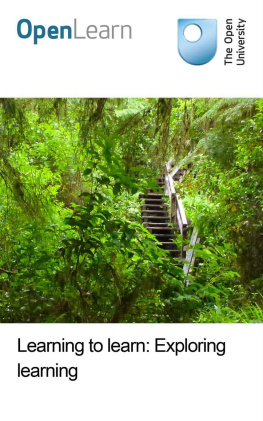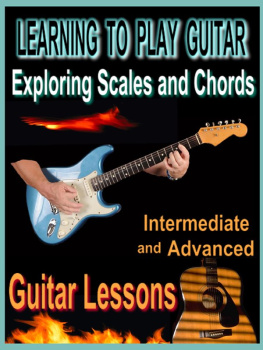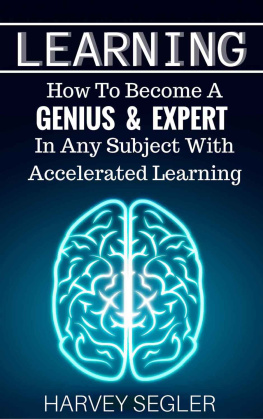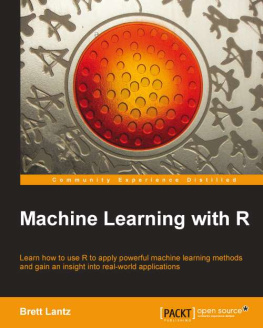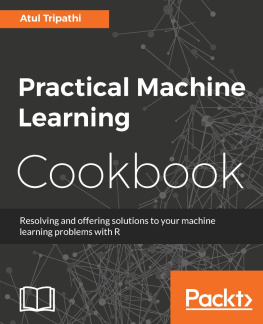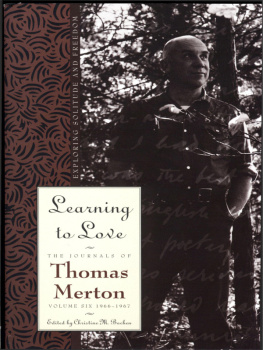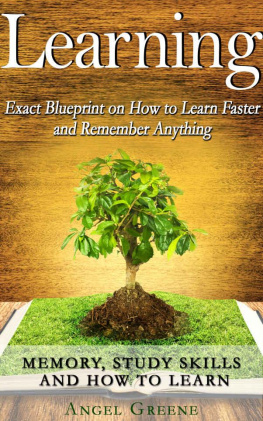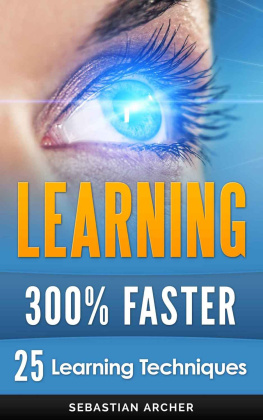Learning to learn: Exploring learning
Here you can read online Learning to learn: Exploring learning full text of the book (entire story) in english for free. Download pdf and epub, get meaning, cover and reviews about this ebook. year: 2016, publisher: The Open University, genre: Romance novel. Description of the work, (preface) as well as reviews are available. Best literature library LitArk.com created for fans of good reading and offers a wide selection of genres:
Romance novel
Science fiction
Adventure
Detective
Science
History
Home and family
Prose
Art
Politics
Computer
Non-fiction
Religion
Business
Children
Humor
Choose a favorite category and find really read worthwhile books. Enjoy immersion in the world of imagination, feel the emotions of the characters or learn something new for yourself, make an fascinating discovery.
- Book:Learning to learn: Exploring learning
- Author:
- Publisher:The Open University
- Genre:
- Year:2016
- Rating:4 / 5
- Favourites:Add to favourites
- Your mark:
- 80
- 1
- 2
- 3
- 4
- 5
Learning to learn: Exploring learning: summary, description and annotation
We offer to read an annotation, description, summary or preface (depends on what the author of the book "Learning to learn: Exploring learning" wrote himself). If you haven't found the necessary information about the book — write in the comments, we will try to find it.
Unknown: author's other books
Who wrote Learning to learn: Exploring learning? Find out the surname, the name of the author of the book and a list of all author's works by series.
Learning to learn: Exploring learning — read online for free the complete book (whole text) full work
Below is the text of the book, divided by pages. System saving the place of the last page read, allows you to conveniently read the book "Learning to learn: Exploring learning" online for free, without having to search again every time where you left off. Put a bookmark, and you can go to the page where you finished reading at any time.
Font size:
Interval:
Bookmark:
About this free course
This free course provides a sample of level 1 study in Education, Childhood & Youth http://www.open.ac.uk/courses/find/education-childhood-and-youth
This version of the content may include video, images and interactive content that may not be optimised for your device.
You can experience this free course as it was originally designed on OpenLearn, the home of free learning from The Open University: http://www.open.edu/openlearn/education/learning-learn-exploring-learning/content-section-0.
There youll also be able to track your progress via your activity record, which you can use to demonstrate your learning.
The Open University, Walton Hall, Milton Keynes MK7 6AA
Copyright 2016 The Open University
Intellectual property
Unless otherwise stated, this resource is released under the terms of the Creative Commons Licence v4.0 http://creativecommons.org/licenses/by-nc-sa/4.0/deed.en_GB. Within that The Open University interprets this licence in the following way: www.open.edu/openlearn/about-openlearn/frequently-asked-questions-on-openlearn. Copyright and rights falling outside the terms of the Creative Commons Licence are retained or controlled by The Open University. Please read the full text before using any of the content.
We believe the primary barrier to accessing high-quality educational experiences is cost, which is why we aim to publish as much free content as possible under an open licence. If it proves difficult to release content under our preferred Creative Commons licence (e.g. because we cant afford or gain the clearances or find suitable alternatives), we will still release the materials for free under a personal end-user licence.
This is because the learning experience will always be the same high quality offering and that should always be seen as positive even if at times the licensing is different to Creative Commons.
When using the content you must attribute us (The Open University) (the OU) and any identified author in accordance with the terms of the Creative Commons Licence.
The Acknowledgements section is used to list, amongst other things, third party (Proprietary), licensed content which is not subject to Creative Commons licensing. Proprietary content must be used (retained) intact and in context to the content at all times.
The Acknowledgements section is also used to bring to your attention any other Special Restrictions which may apply to the content. For example there may be times when the Creative Commons Non-Commercial Sharealike licence does not apply to any of the content even if owned by us (The Open University). In these instances, unless stated otherwise, the content may be used for personal and non-commercial use.
We have also identified as Proprietary other material included in the content which is not subject to Creative Commons Licence. These are OU logos, trading names and may extend to certain photographic and video images and sound recordings and any other material as may be brought to your attention.
Unauthorised use of any of the content may constitute a breach of the terms and conditions and/or intellectual property laws.
We reserve the right to alter, amend or bring to an end any terms and conditions provided here without notice.
All rights falling outside the terms of the Creative Commons licence are retained or controlled by The Open University.
Head of Intellectual Property, The Open University
Edited and designed by The Open University.
Printed and bound in the United Kingdom by Scot Print Ltd.
978-1-4730-1901-0 (.kdl)
978-1-4730-1133-5 (.epub)
In Exploring learning we want you to consider how other people can help you change. If you are studying this course as part of the Learning to learn course, you'll find that it builds on the evidence you gathered about yourself in You and your learning. The Learning to learn course sets out different ways of using learning to help you achieve your goals for change and development.
There are two main aspects to this:
- Involving other people so that you can get feedback, and increase the depth of your self-understanding
- The second aspect involves people who have written about learning in ways that we think you will find useful when thinking about your own skills and personal development.
This OpenLearn course provides a sample of level 1 study in Education, Childhood & Youth
After studying this course, you should be able to:
- use feedback from others to explore qualities, knowledge and skills
- use academic theory to increase an understanding of learning experiences and personal development
- reflect on the academic skills used and the knowledge gained.
This course is slightly different to other OpenLearn Study Units. Although you could study this course on its own, it is also the third course of the free Learning to learn course. This course pilots an exciting new approach that aims to give you more flexibility and a pathway to expand your learning, so please bear with us if things are not quite right.
Learning to learn is for people who are thinking about making changes in their lives, such as returning to study or taking a different direction at work. It will help you to build on what you already know; to consider the choices open to you; to use your skills and qualities to achieve change; and to make plans for the future. To find out more go to the Learning to learn course page.
The course is designed to be studied in one week, although you can take as long as you like. If you are studying the course as part of the Learning to learn course you may like to aim to complete each course in a week.
As you work through the course, breaks will be important. You will have to determine how long you can study this material before you need to stop and relax. Be sure to take advantage of all of your resources friends, family, the internet.
As you work through the course it is a good idea to keep a Learning Journal, where you can make notes on activities, key words and concepts or elements that are particularly relevant for you. Your Learning Journal can either be a notebook or you may wish to create an electronic journal either by creating a document on your computer or mobile device, or create a personal blog.
Thinking about how you are getting on with your learning is also very helpful when it comes to improving how you are learning or simply looking back on your progress so far. You can use your Learning Journal to do this. Think about whether you have found the best time to study, whether you are taking enough or too many notes, and whether you have understood all the concepts covered in a course.
How you use your Learning Journal is personal to you. Writing things down in your own words will help your understanding. It will give you a handy review of the main ideas that you can refer to later. People learn in different ways, and it is important for you to experiment to find out which methods work best for you.
While there is no officially support on this course, we hope that you, as a community of learners, will support each other and share ideas. As this is the first time the course has been run, the OpenLearn team will be monitoring the comments and forums to assist with common issues.
Font size:
Interval:
Bookmark:
Similar books «Learning to learn: Exploring learning»
Look at similar books to Learning to learn: Exploring learning. We have selected literature similar in name and meaning in the hope of providing readers with more options to find new, interesting, not yet read works.
Discussion, reviews of the book Learning to learn: Exploring learning and just readers' own opinions. Leave your comments, write what you think about the work, its meaning or the main characters. Specify what exactly you liked and what you didn't like, and why you think so.

